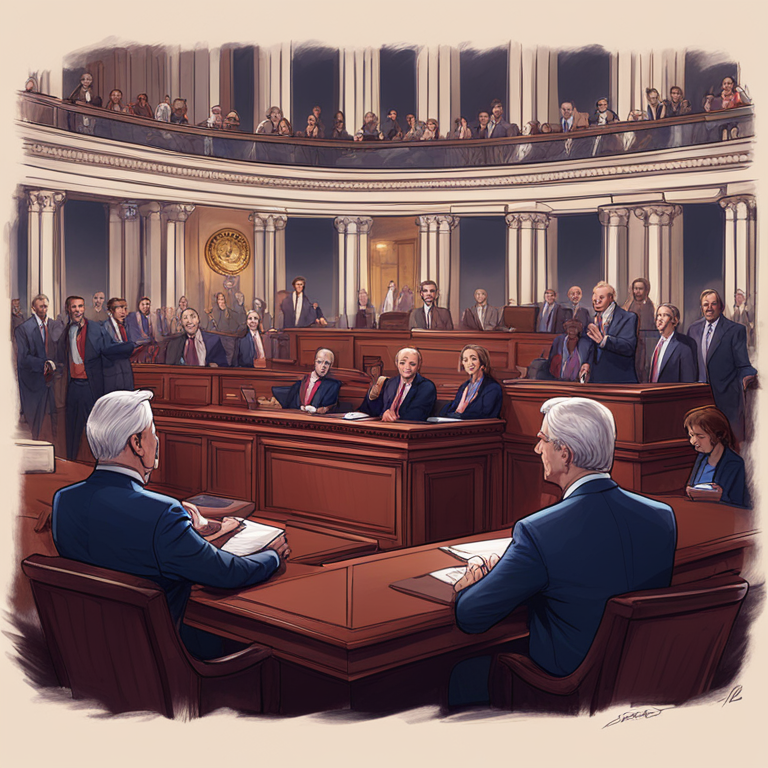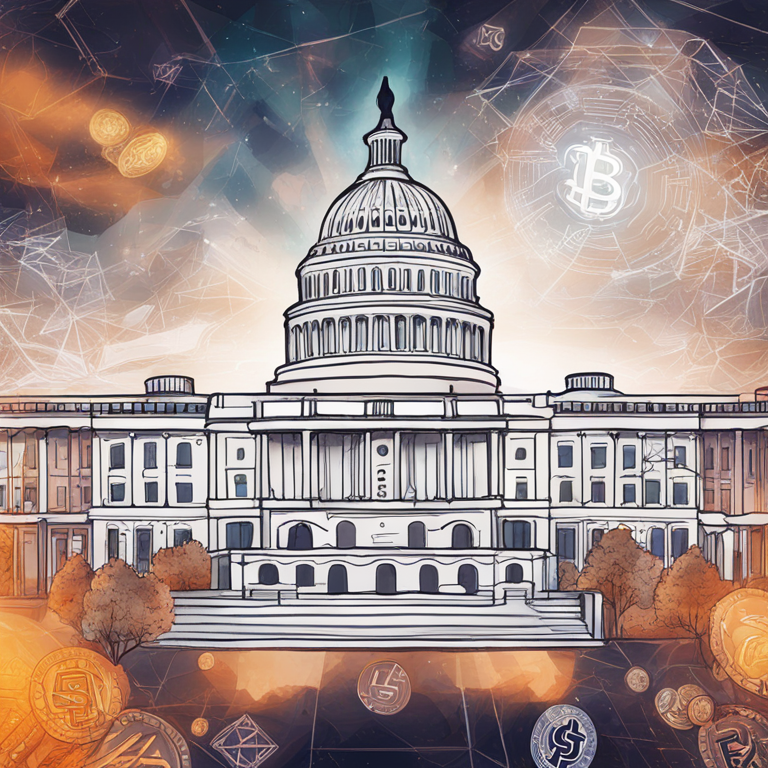Senate Passes Crypto Custody Bill, But Biden’s Veto Threatens – What Will Happen in 10 Days?
- byAdmin
- 17 May, 2024
- 20 Mins

Senate approval and legislative background
Hold onto your Bitcoin wallets, folks! The Senate has finally made a move on the H.J. Res 109 Bill earlier today, and it’s causing quite the stir. This resolution aims to overturn the SEC’s Staff Accounting Bulletin (SAB) No. 121, which has been a thorn in the side of financial institutions hoping to dip their toes into the digital asset pool. With a 60 to 38 vote, the Senate hasn't just passed the Bill—they’ve sent it cartwheeling through the legislative hoops with bipartisan fireworks. Under the Congressional Review Act, H.J. Res. 109 is all set to knock down these pesky barriers, allowing those buttoned-up financial firms to finally play custodian to your precious crypto assets.
But before you start toasting to this newfound financial freedom, there’s a plot twist: President Biden still has his veto power hanging over its head like the sword of Damocles. The White House is not exactly throwing confetti over this Bill. Their argument? Overturning SAB 121 would allegedly “disrupt the SEC’s work to protect investors in crypto-asset markets and safeguard the broader financial system.” Senator Elizabeth Warren, who seems to have a personal vendetta against Bitcoin, is leading the charge against the resolution, citing the unique risks and lovely scandals like Binance and FTX fraud as her ammo.

The proponents of the Bill, however, aren’t backing down without a fight. Their rallying cry is all about consumer protection and decentralization. For instance, Senator Cynthia Lummis, a major proponent and Bitcoin aficionado, has been extremely vocal about dismantling SAB 121. According to her, this bulletin masquerades as simple accounting guidance but is actually a veiled rule under the Administrative Procedure Act. She insists it was pushed out without a nod from the majority of the commission. If they manage to overturn it, more well-regulated financial institutions could hold Bitcoin on behalf of customers, alleviating centralization risks.
The Senate's approval might feel like a significant victory for the crypto community, but now all eyes are on the next move by President Biden. The clock is ticking, and he has 10 days to either veto the Bill, sign it, or simply do nothing (which would be a peculiar strategy even by political standards). A veto would keep the current restrictions firmly in place, while doing nothing means the Bill sashays into law sans signature. Oh, political drama—who needs Netflix when you’ve got this?

White House opposition
The moment the Senate passed the controversial H.J. Res 109 Bill, which aims to overturn the SEC’s SAB 121, the White House didn't exactly roll out the red carpet. They made it quite clear that they're opposing the bill, and we're all wondering if President Biden is warming up his veto pen. Pretty suspenseful, right? The bill received solid bipartisan support in the Senate with a 60 to 38 vote, but that appears to be just the beginning of its hurdles. So, what's the beef? According to the administration, overturning SAB 121 would disrupt SEC’s efforts to safeguard investors in the chaotic cryptocurrency markets. They argue this move could potentially jeopardize the broader financial system. It's safe to say, the crypto custody debate has officially entered the Iron Throne-level drama category.

Senator Elizabeth Warren's objections
If you thought only the White House had issues with the bill, think again. Senator Elizabeth Warren is firmly placing herself in the 'hard no' camp. Warren, who's known for her tough stance on financial regulations, strongly urged her fellow Senate members to reject the resolution. Her main point? Digital assets are like the wild west of the financial world, bringing unique risks like hacking and fraud along for the ride. She cites examples like the Binance and FTX incidents to back up her concerns. Warren emphasizes that the current SEC rules are there to protect investors from these very dangers. So, it’s not just about who's holding your Bitcoins, it's about making sure your digital wallet doesn’t turn into a horror story.
Arguments from proponents of the resolution
Contrasting voices in the Senate believe the bill is a knight in shining armor, coming to rescue U.S. consumers from subpar protection. Proponents argue that the removal of SAB 121 is not just good but essential. They state that existing crypto custody practices are tilted, giving a handful of institutions a hefty chunk of the Bitcoin pool. This, they argue, leads to centralization and, you guessed it, more risk. The heroes of this narrative are looking to diversify where and how digital assets are held, making the crypto ecosystem a more secure place for everyone. According to them, more regulated financial firms should jump into the custody game, armed with robust compliance and security protocols.
Senator Cynthia Lummis' critique
Senator Cynthia Lummis, one of the loudest voices backing the bill, just isn’t buying what SAB 121 is selling. She paints SAB 121 as an impromptu rule disguised as accounting guidance. Lummis accuses the SEC staff of sidestepping the democratic process by implementing the rule without proper commission approval. Her take? Tossing out SAB 121 would unlock the door for more regulated financial institutions to help carry the Bitcoin baggage. According to Lummis, these institutions are more than capable of handling digital assets, boasting robust compliance frameworks and airtight security protocols. Essentially, it's time to let the crypto custodians out of the doghouse and into the well-guarded mansion of regulated banking systems.

Future uncertainty
Alright folks, let’s dive into the latest episode of our favorite political drama, "Crypto Wars: Attack of the Custody Bill!" Earlier today, the Senate finally passed the H.J. Res 109 Bill, throwing a major curveball into the world of digital assets. With a vote of 60 to 38, this resolution aims to overturn the SEC’s Staff Accounting Bulletin (SAB) No. 121, which restricts financial institutions from acting as custodians for assets like Bitcoin.
This bill's got more bipartisan support than a puppy at a birthday party, yet it's now staring down the barrel of President Biden’s potential veto. The White House isn't exactly throwing confetti over this resolution. In fact, they've threatened to block it faster than you can say "blockchain." Their argument? Overturning SAB 121 could "disrupt the SEC’s work to protect investors in crypto-asset markets and safeguard the broader financial system."

Senator Elizabeth Warren is leading the opposition like a seasoned pro. She argues that digital assets represent a Pandora’s box of risks, from hacking incidents like those at Binance and FTX to the volatile nature of crypto markets. But don’t be fooled; the proponents of H.J. Res 109 aren’t backing down without a fight. They believe that overturning SAB 121 is critical for consumer protection and decentralizing the crypto market. Senator Cynthia Lummis, the bill's chief advocate, claims that SAB 121 is essentially a rogue rule disguised as accounting guidance, introduced without proper oversight.
If this resolution succeeds in bulldozing SAB 121, more regulated institutions could start holding Bitcoin on behalf of customers. Critics of the bulletin argue that financial institutions are already well-equipped to handle digital asset custody, thanks to their existing security protocols and compliance frameworks. Of course, this is where things get juicy—President Biden now has 10 days to decide whether he'll veto the bill, sign it, or just let it become law without his John Hancock. But given his previous statements and Senator Warren’s opposition, it looks like the veto pen will come out swinging.
So, what's next? The clock is ticking, and the crypto community is on the edge of their seats. If Biden vetoes, the resolution’s progress comes to a screeching halt, keeping the current restrictions on financial institutions intact. But don't forget about the "pocket veto" scenario—if Congress adjourns during the 10-day period, Biden can just let the bill die quietly.
In summary, buckle up and grab some popcorn. The next 10 days are going to be a rollercoaster ride for anyone invested in the crypto space. Will the bill survive the presidential gauntlet? Will crypto custody become the new norm for financial institutions? Stay tuned to find out!
Ethan Taylor
Ethan Taylor here, your trusted Financial Analyst at NexTokenNews. With over a decade of experience in the financial markets and a keen focus on cryptocurrency, I'm here to bring clarity to the complex dynamics of crypto investments.


